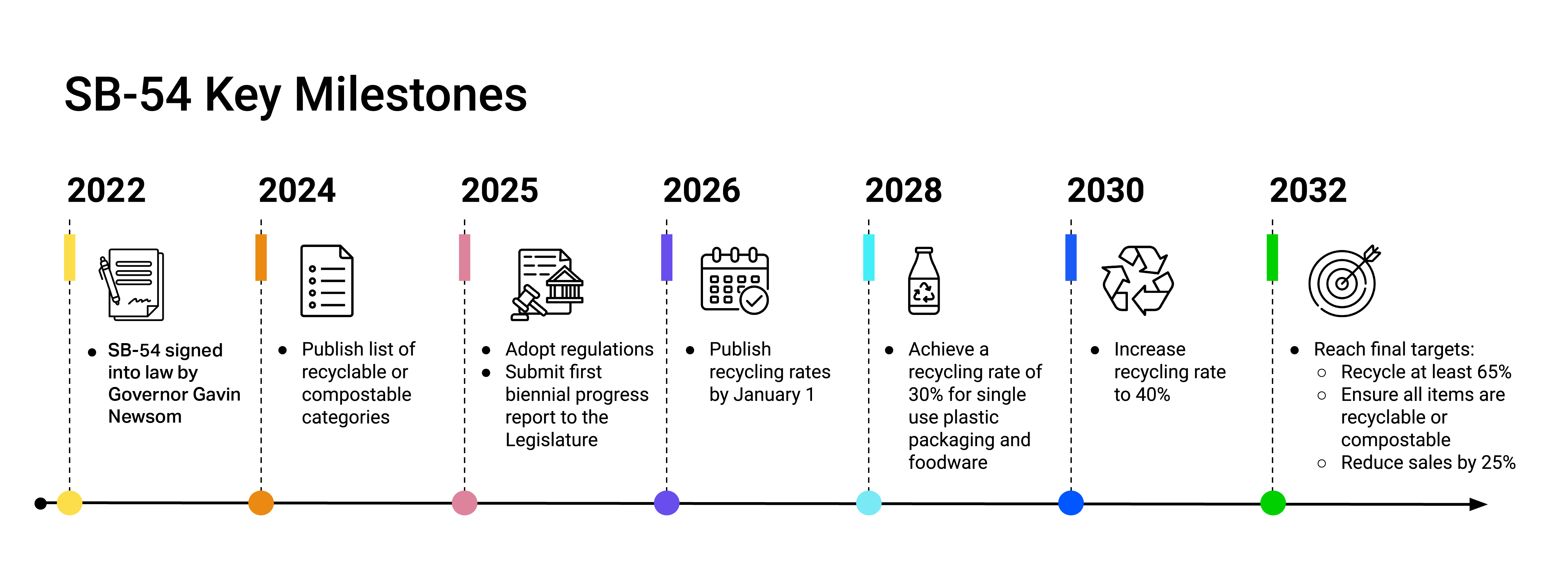Understanding the Core Objectives of SB-54
Signed into law by Governor Gavin Newsom on June 30, 2022, SB-54 sets ambitious targets for reducing single-use plastic packaging and foodware. By 2032, California aims to:
- Cut single-use plastic packaging and foodware by 25%.
- Ensure that 100% of these items are recyclable or compostable.
- Recycle at least 65% of single-use plastic packaging and foodware.
These goals represent a significant shift in how we manage plastic waste, emphasizing reduction at the source rather than relying solely on end-of-life recycling efforts.
Shifting Responsibility: Extended Producer Responsibility (EPR)
One of the most transformative aspects of SB-54 is the implementation of an Extended Producer Responsibility (EPR) program. Under this framework:
Producers’ Responsibilities
Producers are now accountable for managing their products throughout their lifecycle. This includes designing products that are easier to recycle or compost and contributing financially to waste management programs.
Financial Implications
The law mandates that industry members raise $5 billion over ten years. These funds will be used not only to cut plastic pollution but also to support disadvantaged communities disproportionately affected by plastic waste.
Key Components of SB-54 Implementation
Needs Assessment
CalRecycle is tasked with developing a statewide needs assessment in collaboration with stakeholders. This assessment will guide budget allocation and strategic planning for achieving the state’s pollution reduction goals.
Advisory Board
An advisory board has been appointed by CalRecycle’s director to identify barriers and solutions in creating a circular economy. The board advises producer responsibility organizations (PROs), producers, and CalRecycle itself on implementing SB-54 effectively.
Covered Material Categories
By July 1, 2024, CalRecycle must publish a list of “covered materials,” which include single-use packaging and food service ware deemed recyclable or compostable under Public Resources Code Section 42061(e).
Timeline for Achieving Milestones
SB-54 outlines several key milestones:

2024:
- Publish list of recyclable or compostable categories.
2025:
- Adopt regulations.
- Submit first biennial progress report to the Legislature.
2026:
- Publish recycling rates by January 1.
2028:
- Achieve a recycling rate of 30% for single-use plastic packaging and foodware.
2030:
- Increase recycling rate to 40%.
2032:
- Reach final targets:
- Recycle at least 65%.
- Ensure all items are recyclable or compostable.
- Reduce sales by 25%.
Benefits Beyond Environmental Impact
While the primary goal is environmental sustainability, SB-54 also offers several socio-economic benefits:
Supporting Disadvantaged Communities
Funds raised through EPR will help mitigate the impact of plastic pollution on low-income and rural areas most affected by waste management challenges.
Driving Innovation
By pushing producers towards more sustainable product designs, SB-54 fosters innovation across industries. Companies will need to rethink their approach from design through disposal, leading to advancements in material science and product engineering.
How Specification Management can Best Prepare You for SB-54 and Other Packaging Sustainability Regulations
Specright can be a valuable tool for companies navigating California’s SB-54 and other packaging sustainability regulations due to its comprehensive capabilities in packaging data management and compliance. Here’s how it can help:
- Centralized Data Management: Specright offers a centralized platform for managing all packaging data. This is crucial for SB-54, which mandates strict tracking and reporting of packaging materials. By consolidating data on materials, quantities, and suppliers, companies can more easily monitor their packaging footprint and ensure it aligns with regulatory requirements.
- Regulatory Compliance Tracking: The platform allows businesses to track compliance with various regulations, including SB-54, which requires a reduction in single-use plastic packaging and an increase in recycled content. Specright can help companies maintain records of material types, quantities, and recyclability, facilitating easier reporting and adherence to state laws.
- Sustainability Metrics: Specright provides tools to measure and analyze sustainability metrics. This includes tracking the percentage of recyclable materials, recycled content, and other sustainability indicators required by SB-54 and similar regulations. This data helps companies make informed decisions about their packaging strategies and improvements.
- Supply Chain Transparency: Effective compliance often depends on knowing where materials come from and how they are processed. Specright’s platform enables greater transparency throughout the supply chain, helping companies ensure that their suppliers meet regulatory standards and that their packaging materials are sustainably sourced.
- Regulatory Updates and Adaptation: Specright can help companies stay updated with changes in regulations and adapt their packaging strategies accordingly. As regulations evolve, the platform allows for adjustments in data management practices to maintain compliance.
- Reporting and Documentation: The platform simplifies the process of generating reports and maintaining documentation required for regulatory submissions. This can save time and reduce the risk of errors in compliance reporting.
By leveraging Specright’s capabilities, companies can more effectively manage their packaging data, track compliance with SB-54 and other sustainability regulations, and implement strategies that align with both legal requirements and environmental goals.
Conclusion
SB-54 represents a bold move towards addressing one of our most pressing environmental issues—plastic pollution. By shifting responsibility from consumers to producers through an Extended Producer Responsibility program, California aims not just for compliance but for genuine systemic change. With clear targets set for reduction, recyclability, and compostability over the next decade, this legislation could serve as a model for other states—and even countries—looking to tackle similar challenges.
As we collectively strive toward these ambitious goals, collaboration between government agencies like CalRecycle, producers across various sectors, and informed consumers will be crucial in building a truly circular economy that benefits both our planet and its people.
To learn more about Specification Data Management and how Specright can help you reach your sustainability goals, get a demo here.
Explore More Blogs
Get Started
With Specright’s Solution Suite, you can digitize, centralize, and link your specification data to drive efficiencies, intelligence, traceability, and collaboration within your organization and across your supply chain network.




